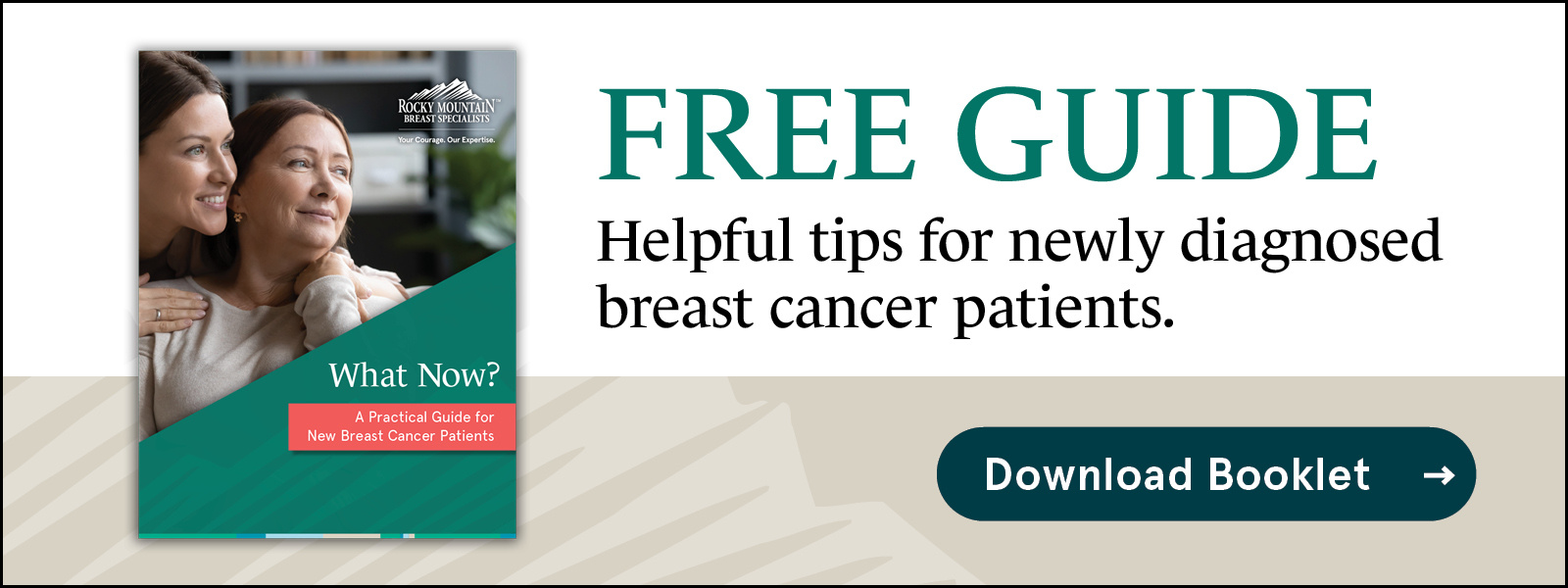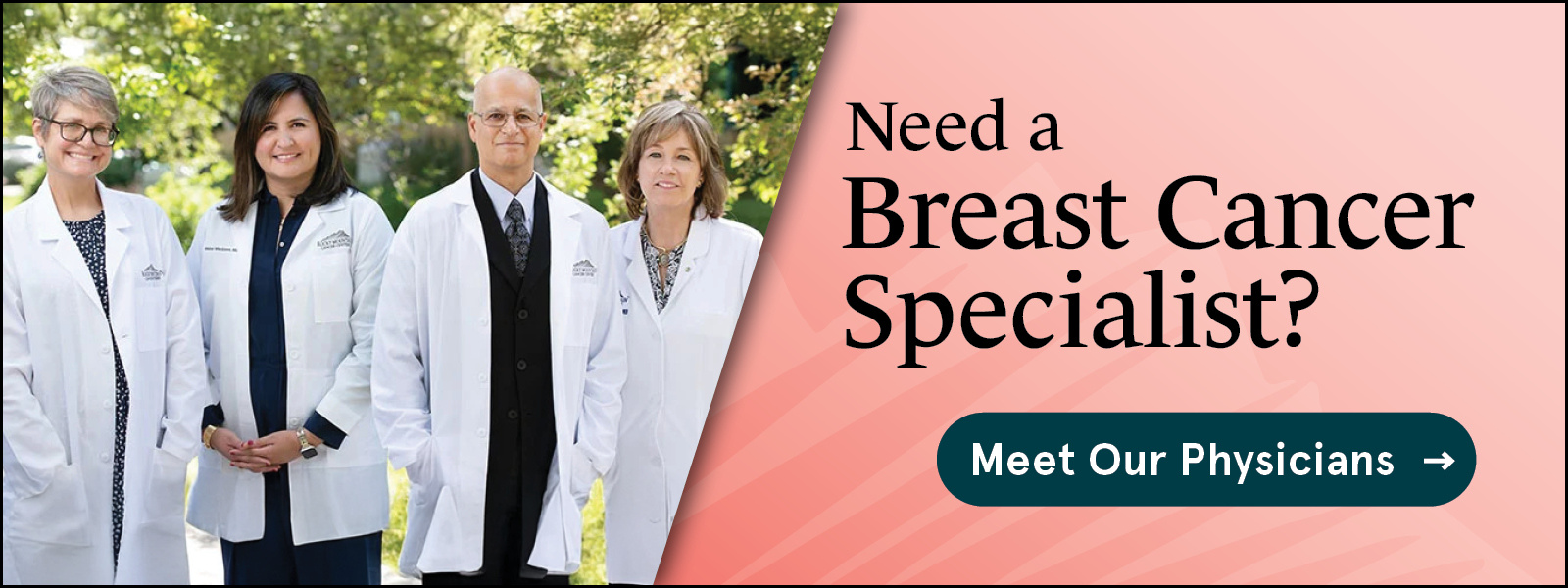Top 10 Questions to Ask a Breast Cancer Oncologist Before Starting Treatment
11 min read

There is more hope and promising outcomes for breast cancer patients than ever before thanks to clinical research! The treatments given to each patient are highly specific to the type of breast cancer and other characteristics. What works for one patient isn’t necessarily the same path for another patient. Let’s answer some common questions asked by breast cancer patients as it relates to your type and stage of breast cancer.
1. How do you know what type of breast cancer surgery I need?
The tests, images, and biopsy you had as part of the diagnosis and staging process provide key information about your treatment options. Some treatments work better for early-stage breast cancer; other types are best for more advanced breast cancer. There are also some situations where your family history and inherited genetic test results could play a role in what’s recommended.
The two most common types of breast cancer surgery are:
- Lumpectomy - removes just the cancerous tumor and surrounding tissue (called the margins of your tumor), leaving most of your breast intact.
- Mastectomy - the surgical removal of the entire breast. It’s recommended if the cancer has spread within the breast and a lumpectomy would require too much of the breast tissue to be removed.
In some cases you may have an option about what surgery is OK for you. Talk to the surgeon about a conservative versus an aggressive approach.
There are varying types of each of these surgeries that your breast cancer surgeon will discuss with you, including options to conserve the nipple and minimize scarring. Many women will also have breast reconstruction surgery after the breast cancer is removed. This is often done at the same time the breast cancer is removed. Or in some cases it may be a second surgery later on.
Related blog: How Likely is Breast Cancer to Return after a Lumpectomy or Mastectomy?
2. If I have a lumpectomy, will the breast that had the cancer look different from the other breast?
Your breast cancer care team will do their best to help you retain as much of your breast shape and size as possible. But, it depends on the size and location of your tumor, how much tissue is removed, and the size of your breasts before cancer. Most lumpectomy patients have very small cancers removed, resulting in little or no change in the size and appearance of the treated breast.
If you have small breasts and a lot of tissue is removed, the size of your breasts will not be the same. If you have large breasts, you may need the one that did not have cancer to be resized to match the one that had the cancer removed. A plastic surgeon who is familiar with breast reconstruction can be included in the surgery planning process to rebuild the breast so it can match the other side as closely as possible.
See who is on the breast cancer care team.
3. Why do lymph nodes have to be removed? How will this affect me?
Lymph nodes in the underarm area are the first place that breast cancer usually spreads beyond breast tissue. If cancer reaches the lymph nodes, it can spread throughout your body via the lymph system. If your lymph nodes contain cancer cells, they must be treated or removed to stop cancer growth and spread.
One or more underarm lymph nodes may be removed during surgery and biopsied to check for cancer cells. Lymph node surgery can also be done as a separate procedure.
Lymph node biopsy removes one or more lymph nodes to check for any cancer cells that have spread to lymph nodes. Called a sentinel lymph node biopsy, this surgery is usually done as an outpatient. It is the most common and least invasive type of biopsy. It can also be done during your lumpectomy. Axillary lymph node dissection is another lymph node biopsy method.
If you have just a few lymph nodes removed it may affect you very little. If your breast cancer requires the removal of many lymph nodes, it can cause fluid build up (lymphedema) and some discomfort. Learn more about lymphedema here.
4. If the breast surgeon said they “got all the cancer out,” why do I need radiation therapy or other treatments?
You may be advised to have radiation after breast cancer surgery to help ensure that any remaining cancer cells have been killed. This lowers the likelihood of the cancer returning.
Your breast cancer care team may also recommend you have other treatments after surgery, depending on the specific type of breast cancer, including:
- Hormone therapy may be recommended for breast cancers that are hormone sensitive to estrogen or progesterone. Some hormone therapies block hormones and keep them from attaching to the hormone-receptors on cancer cells. Others reduce your body’s natural production of hormones. Hormone therapy can be used after surgery to lower your risk of a recurrent cancer, or used to shrink the tumor before surgery. Shrinkage reduces the amount of breast tissue that must be removed. It also signals how well your cancer responds to hormone therapy when used before surgery. Hormone therapy is also used to help control cancer that has spread to other parts of your body (metastasized).
- HER2 positive breast cancer is treated with a therapy that specifically targets HER2 protein receptors. It’s used when the HER2 protein is overproduced, pushing breast cancer cells to grow faster. It can be combined with chemo, surgery, or other therapies to increase effectiveness.
- Cancer that has spread to the lymph nodes or other areas of the body may be treated with chemotherapy.
- Recurrent breast cancer can be treated with immunotherapy and other targeted therapies that are specific to a gene mutation found in the cancer cells.
Learn more about breast cancer treatment options.
5. Can I choose radiation instead of chemotherapy – or chemotherapy instead of radiation?
Not every breast cancer patient needs chemotherapy! However, if your treatment plan includes chemotherapy it’s because it has been proven to work best for the type and stage of your specific breast cancer.
When treatment recommendations are made, your preferences are considered, of course. However, other factors – the type of cancer you have, if it has hormone receptors, and its location – are vitally important to receiving the most effective treatment.
Radiation therapy is localized treatment, targeting only a specific area where the cancer is growing. It’s delivered to a specific area, and most side effects are related to the treatment area. This, however, may not be the best recommendation if the cancer has spread outside of the breast.
Chemotherapy, targeted, hormonal, and immunotherapy therapies are called systemic. They are given as injections or infusions that affect the whole body, wherever cancer cells have spread beyond the initial tumor. Some are even available in pill format. Many patients benefit from systemic therapy because it can reduce your risk of recurrent and/or metastasizing breast cancers.
Systemic treatments are also used for several different reasons depending on whether the cancer is hormone-positive, HER2-positive, triple-negative or triple-positive.
Related blog: What to Know About Radiation Therapy for Breast Cancer
6. How long does breast cancer treatment take?
No one can provide an exact time frame for breast cancer treatment. There are many variables involved, including your cancer’s type and stage, your age and overall health, your preferences, and the number of treatments included in your treatment plan. It’s also affected by how quickly you’re able to recover from surgery before starting other treatments.
Treatment length varies:
- Radiation before surgery can take four to six weeks; radiation after surgery can last four to eight weeks.
- Chemotherapy is given in cycles that require exact timing of individual treatments. These vary from once a week to once every three weeks. A series of several treatments is considered a cycle. After each cycle is a rest period so the body can recover. You may need more than one cycle. Early-stage breast cancer may only require three to six months of treatment. If you have advanced breast cancer, treatment is typically longer.
- Hormone therapy, an oral medicine for breast cancer patients, can last for up to five years after surgery.
- Targeted therapy and immunotherapy are usually given every few weeks for varying periods of time.
- Immunotherapy may be provided for four to six months depending on how your body reacts.
7. Am I going to lose my hair from breast cancer treatment?
Most women don't lose their hair with breast cancer treatment if they do not have chemotherapy. Radiation can cause loss or thinning of hair in the area being treated. For breast radiation, that means there is little chance of losing the hair on your head.
However, hair loss often occurs with chemotherapy. You may lose hair from your scalp, eyelashes and eyebrows, armpits, and pubic areas. Hair loss partially depends on the chemo drugs and dosage you receive. The actual loss can range from thinning to complete loss.
For many patients, hair loss is temporary and regrowth may start within three to six months after your treatment ends. Hair regrowth, and the volume of hair that returns, is different for each patient. The texture, color, and thickness may be different compared to your hair before diagnosis.
If your oncologist says your treatments will likely cause hair loss, you may want to cut your hair short, or choose a wig or hair wraps before treatment begins.
Cooling cap technology may be an option for you. This procedure works like a refrigerator to cool your scalp before, during, and after chemotherapy treatments. By sending cooling fluids into headgear (like a helmet or hood), it cools the scalp and constricts blood vessels. Less blood flow means fewer chemotherapy drugs reach the scalp. Your insurance may not cover it because it does not have FDA approval.
Read patient story: Keeping Her Hair During Chemo Helps One Breast Cancer Patient Feel ‘in Control’
8. Am I going to feel sick after treatments? For how long?
Breast cancer treatments kill cancer cells, but can also damage healthy cells. If healthy cells are damaged you may have these side effects, depending on the type of treatment you're having.
Radiation’s side effects depend on the type of radiation and which area is being treated. Typical side effects include moderate fatigue, skin irritation or darkening, and breast swelling toward the end of treatment. Lymphedema may occur if your underarm lymph nodes were treated. Low blood cell counts are more common if you have radiation at the same time as chemotherapy. It can take several weeks before side effects stop.
Chemotherapy typically causes nausea and vomiting, especially if you typically vomit when you are sick, you have a lot of anxiety, are female, and are younger than age 50. There are several good medications to prevent nausea. These may be added to the IV infusion and/or can be taken in pill form at home.
Chemotherapy may also cause fatigue, hair loss, loss of appetite, constipation or diarrhea, changes in your skin and nails, and a higher risk of infections. Other side effects can occur to your memory and concentration, and numbness or tingling in fingers and toes (neuropathy). Shorter-term side effects often go away after treatment is finished or within a year after completing chemotherapy.
Immunotherapy given as immune checkpoint inhibitors may cause fatigue, nausea, constipation, diarrhea, skin irritations, and cough. Although rare, some patients may have an allergic-type reaction when receiving immunotherapy drug infusions.
Targeted therapies’ side effects depend on the drug you receive and its dosage. These drugs can cause high blood pressure, fatigue, skin and nail problems, loss of hair color, breast swelling, diarrhea, and problems with blood clotting and wound healing. Liver problems, lung disease, and heart damage leading to congestive heart failure can occur, depending on the drugs you receive. Heart problems are usually worse in women who are over age 50, are obese, and have pre-existing heart problems.
9. What long-term effects of breast cancer treatment should I be aware of?
Long-term side effects can appear months or even years after treatment ends.
Chemotherapy’s potential long-term side effects include infertility and early menopausal symptoms (hot flashes and the end of menstrual periods), heart disease, bone thinning (osteoporosis), or leukemia.
The risk of developing a secondary cancer can increase with radiation, although this is rare.
Immunotherapy can cause autoimmune reactions because the drugs limit the protections of your body’s immune system. Although rare, it can damage the lungs, intestines, hormone glands, kidneys, or liver.
Related blog: Monitoring Late Effects of Breast Cancer Treatment
10. How likely is it that my breast cancer will come back?
Returning or recurrent breast cancer means it has come back after your treatment was successfully completed. A few cancer cells may have survived treatment and started to multiply, developing into another tumor. This can happen months or even years after your first breast cancer treatment.
Your risk of developing recurrent breast cancer depends on your initial cancer’s characteristics, including:
- Type of cancer
- Cancer’s stage, grade, and size at initial treatment
- Hormone-receptor status
- If cancer was found in your lymph nodes and has spread
If the cancer returns to the same area as the original cancer, it’s called a local recurrence. A distant recurrence means cancer has spread to other areas of your body, usually the bones, liver, or lungs.
In general, breast cancer is most likely to recur in the first two years after treatment. Once you reach five years cancer-free, the likelihood of it returning goes down significantly.
Related blog: How Likely is Breast Cancer to Return after a Lumpectomy or Mastectomy?
Rocky Mountain Breast Specialists: Colorado’s Leading Providers of Breast Cancer Care
By learning all you can about your breast cancer treatment options, you can make an informed decision about which treatment is best for you. The breast cancer doctors at Rocky Mountain Breast Specialists (RMBS) are happy to answer your questions and be with you every step of your treatment and recovery.
At RMBS, we provide multidisciplinary treatment clinics that give our patients better outcomes. Our entire care team works together to coordinate treatments and guide you to the best outcome. They’ll analyze the specific type and stage of your cancer and develop a treatment plan designed just for you. They’ll also consider your personal preferences, medical history, other health conditions you have, past history of radiation, your age, and overall health when creating the most advanced treatment plan possible for you.
Learn more about our multidisciplinary approach to breast cancer care.
Our breast cancer centers are located in the Denver area, Colorado Springs, Boulder, and throughout the Front Range. Request an appointment at a location that’s convenient for you. Second opinions are also available.


